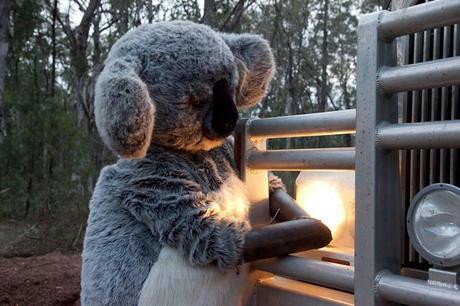
by AAP / The Australian
It must have been an odd site for a Saturday morning.
A grown adult in a furry gray suit chained to a large truck at the mercy of the western NSW sun.
But unlike the scenes that commonly face their city-counterparts, this scenario wasn’t a case of the morning after for police at the Maules Creek mine site.
An environmental activist – under the identity of the “cranky koala” – was chained to a large truck in the Leard State Forest as part of an ongoing blockade.
“He was there to highlight the threat to koalas that are hibernating and how winter clearing will affect different animals,” Leard Forest Alliance spokeswoman Helen War told AAP.
Whitehaven is spending $767 million developing Maules Creek mine in Leard State Forest and is progressively demolishing around 1660 hectares of native woodland to extract coal by early 2015.
The alliance says its protest has intensified in the last week after forest clearing began.
“It’s been very intense and a passionate week or two for the people here in camp,” Ms War said.
Alongside the cranky koala, who Ms War says police removed from their post on Saturday, Greenpeace says a number of protesters have been suspended in trees for more than 24 hours.
Freya Harvey admits being strung to a tree is far from comfortable but she is willing to be there are long as it takes.
She said she could see trucks clearing trees from her spot 15 metres above the ground.
“It’s a bit daunting and not the nicest feeling to see it happening,” Ms Harvey told AAP.
The tree-high activists take turns sleeping in a suspended cargo net and hammocks and use a portable bucket toilet when nature calls.
Whitehaven Coal had expressed a preference to avoid winter and early spring land clearances to avoid the “key breeding/hibernation seasons for threatened bat and bird species”.
But the government recently approved a revision to the firm’s biodiversity management plan (BMP).
Whitehaven’s plans include using machinery to shake inhabited trees to “encourage” creatures to leave before “gently” bulldozing and leaving them overnight to allow remaining animals to escape.
“These measures are comprehensive, and address issues associated with clearing in cooler months and at other times,” a Whitehaven spokesman told AAP this week.

